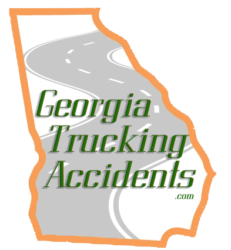Georgia Truck Accidents Caused By Driver Negligence
Truck Driver Negligence Attorneys in Georgia
Truck drivers in Georgia owe everyone on the road a duty of care. That is the essence of negligence. Truck drivers are not the only people on the road who owe another motorist a duty to drive reasonably. In fact, every driver shares that same duty. The difference between the ordinary motorist and a truck driver is the vehicle that the truck driver operates. The vehicle dictates the standard of care the driver must follow in Georgia.
Large trucks can weigh anywhere from 10,000 pounds to 80,000 pounds. By contrast, the average passenger car weighs around 4,000 pounds, more or less. Consequently, truck driver negligence is not judged by how an ordinary person in the shoes of the average driver would have performed in a particular circumstance, but by how the average truck driver, with all of his or her training and expertise, would act in the same situation. What the legalese boils down to is that truck drivers, because of the danger their trucks present to average motorists, considering their knowledge, skill, and training, have to be more careful on the road than the average motorist.
Federal regulators and the Georgia Department of Transportation (GDOT) work together to pass and enforce regulations designed to make the presence of trucks on Georgia’s roads safer. Truck drivers must take and pass Commercial Driver’s License (CDL) courses. This course is designed to teach the aspiring truck driver how to drive the truck safely. Every large truck driver must possess a valid CDL before getting behind the wheel of a large truck. Consequently, every CDL driver knows and understands the minimum safety requirements to which they must adhere.
In addition to the CDL requirements, GDOT issues new regulations annually governing large truck operation in Georgia. GDOT released the most recent regulations on July 1, 2017. The regulations spell out in painstaking detail the safety procedures a truck driver is obligated to follow. The rules are highly specific and discuss in great detail each and every step a truck driver must take before and after the trip to be certain the truck is in good repair as well as the safety standards the truck drivers must follow while operating a truck. Any deviation from those procedures could be used as evidence that the truck driver was negligent when a crash occurred.
The question of whether a truck driver is negligent in causing a crash will depend upon a host of factors. GDOT’s regulations are a good starting point for determining whether the driver deviated from the standard of care truck drivers must use when driving in Georiga. Depending upon the nature of the crash, it might be important to know whether:
- the driver performed a pre-trip check of the truck’s operating and safety systems including brakes, oil pressure, lights, hitches, and the like;
- the driver was operating at a speed that was too fast for the road conditions;
- the driver followed the mandatory hours of service requirements;
- the driver was fatigued, ill, or otherwise medically unfit to drive when the crash happened;
- the driver observing safe driving techniques when passing, stopping, or turning;
- the driver distracted while operating by using a cell phone or texting while driving; and
- the driver was under the influence of alcohol or other substance at the time of the crash.
This list is by no means exhaustive, and other factors could play a role in causing a large truck crash.
A negligent truck driver or the company for whom the truck driver works could be liable for damages if found negligent. Damages in Georgia could be awarded to the large truck crash victim for:
- past and future medical expenses;
- loss of limb or paralysis;
- lost wages;
- loss of future earning capacity;
- pain and suffering; and
- punitive damages if the driver operated recklessly.
Put Our Law Firm’s Over 33 Years Of Legal Experience To Work For Your Case!
The time you have to legally receive compensation is limited.
Sources: cited within.

